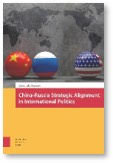China- Russia Strategic Alignment
On Tuesday 12 July 2022 AIIA NSW hosted the launch of China-Russia Strategic Alignment in International Politics by Dr Alexander Korolev, senior lecturer in politics and international relations in the School of Social Sciences at the University of New South Wales. His book asks how closely aligned China and Russia are, why China doesn’t condemn Putin’s Ukraine war, and how best to define and measure strategic alignments between states.
In a complex address, Dr Korolev drew on area studies and international relations theory to answer these questions. His research establishes that the strategic alignment in China-Russia relations has been growing since the Cold War ended and that this alignment has been moving towards a full-fledged alliance. The war in Ukraine is unlikely to change that trend.
Dr Korolev illustrated his conclusions with a comprehensive PowerPoint presentation which he has kindly agreed to share with our readership:
His discussion and the question and answer session which followed covered the following points:
- The China-Russia relationship had been developing over many decades – from confidence-building measures, through increasing consultation and material cooperation, leading to a full strategic alignment. This model could be applied to a range of strategic alignments and alliances.
- Key factors were their balance of power, balance of interests and balance of threats. Russia today faced real and dangerous threats from the west rather than from a rising China. The China-Russia alignment was not just ad hoc, but had grown from lasting systemic strategic factors.
- But there was not a total identity of policy: Russia had sent troops to Kazakhstan to resolve recent political unrest, while China – with its pipeline and belt-and-road objectives in mind – had adopted a hands-off approach.
- China and the US were on a long-term collision course. Historically, out of 16 major international power transitions such as the current US-China rivalry, only four had been peaceful.
- US criticism of China over Ukraine had to be seen in this context; there was no comparable US criticism of India’s Ukraine neutrality (though India could come under more pressure if the conflict continued).
- The expanded and unified NATO that had developed in response to Russia’s invasion of Ukraine might break down in time, given the importance of Russia to the European economies.
- Dr Korolev acknowledged the complexity of South East Asian countries’ relations with both China and Russia. He agreed with the suggestion that the US would be more likely to go to war over Taiwan than Ukraine.
________________________________________________________________________

Dr Korolev’s China-Russia Strategic Alignment in International Politics can be bought at a 20% discount via the AUP (Amsterdam University Press) website using the code “NEWAUP2“, valid until 30 September 2022 for the print and eBook. Once your book is in the basket, the code can be entered via the “Use a discount code” link.